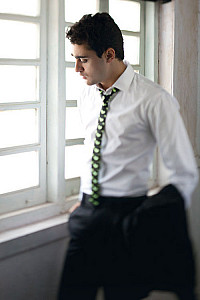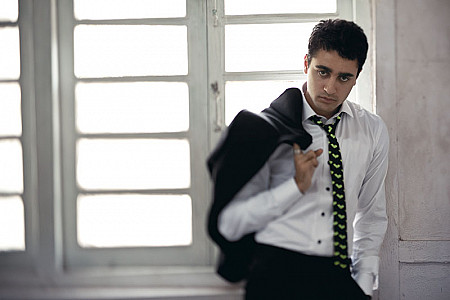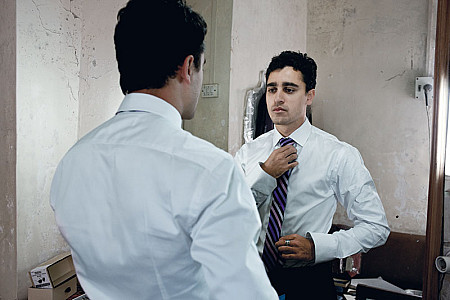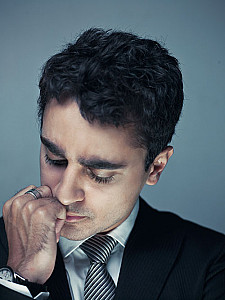Imran Khan: An Actor and a Gentleman
The brows are furrowed in intense concent-ration. The facial expression is blank. The eyes are reflective. The humour is deadpan. No smirk, no smile, not even a laugh line. And yet we all titter. What is it about this new kid on the block that sends hearts fluttering and makes you yearn to know more? As I watch Imran Khan step self-consciously in front of the camera, taking shot after shot effortlessly, I can’t help but notice his face has character. Whether it emanates from the well-crafted jawline or the intensely expressive eyes, it’s unmistakable. After every shot, Imran lithely hops over for a critical assessment. He is his own worst (or best) critic. As he discusses camera angles with photographer Colston Julian, I learn that he is a self-taught actor (or more accurately, natural), while he has been formally trained in writing, cinematography and direction at New York Film Academy, Los Angeles.
In a crisp white shirt and black trousers with a funky Batman tie (he is a huge fan), Imran sits cross-legged before me on a chair with an expectant look on his face. Why would someone who looks as good as him not attempt to give acting a shot and head straight for direction? As a child he picked up the camera, playing with genres like sci-fi (on the lines of Alien), Agatha Christiesque murder mysteries and spoofs. Post-school, he stumbled from market research into advertising (including ad films). At this point he realised films are what he understands best. After all, the mere smell of celluloid gives him butterflies in his stomach.
Acting was never his intention. A sequence of events – or fate – combined with Abbas Tyrewala’s faith in him led to Imran being cast as the lead in Jaane Tu…Ya Jaane Na (2008), the film that made him an overnight star. Despite having played a young Aamir Khan in Qayamat Se Qayamat Tak (1988) and Jo Jeeta Wohi Sikandar (1992), he says matter-of-factly, “I never thought of myself as being a very good looking guy and figured there was no place for me in the Hindi film industry. Hrithik Roshan set the bar. He is a complete package. I’m not built like him, I can’t dance even a quarter as well as he can – that’s something I aspire to.”
Noticing my imperceptible shiver with the blast from the air conditioner, he solicitously jumps to his sock-covered feet and props himself up on his toes to tone down the room temperature. Then in a flash he is back in interrogation mode. Born in Wisconsin, America, to Nuzhat Khan (director Mansoor Khan’s sister) and Anil Pal, he moved to Mumbai with his mother after his parents’ divorce. He was a year and a half at the time. In all the schools he went to – including Bombay Scottish (Mumbai), two schools in Ooty, a nature-based gurukul in the Nilgiris, Bangalore and Fremont high school in Sunnyvale, California, he was always the new kid in school. “It was really tough. I didn’t grow up being considered cool or dating a lot of girls. I was into science and books and not into sports. I was always the odd one out at parties, sitting in the corner, knowing barely two or three people.”
Imran admits that constantly moving from school to school made him more independent but also a bit of a loner. “I don’t socialise a lot and like silence. I can’t be on all the time – I need occasions when I am with absolutely no one so I can reset, recharge, rejuvenate and then come back out.” He has only just started to make friends in the industry – think Ranbir Kapoor – since he grew up not knowing anyone. Though fond of listening to music, he can’t abide television. He actually doesn’t own a TV or a cable connection. Surprising, considering that he is an obsessive movie buff and watches three to five movies a day (on his computer) and is happiest when at a movie theatre.
As we get to the much-publicised fact that girls are extremely “well-behaved” around him – “very calm and composed – no crazy stuff,” I discover he is also the guy who likes to be in the background and tries not to get noticed. “I roam around town (getting a roll at Candies, Bandra) practically invisible. It’s like an internal switch I can turn on and off. I can walk into a room and make everyone turn around and notice me, or I can walk across a room and no one will ever realise that I am there.”
He can be brutally blunt without any perceptible intention of causing discord. “I can’t make stuff up or say anything that isn’t exactly as it is. I live my life by fact and follow reason and logic. I find emotion and irrationality hard to deal with.” Does that make relationships complicated? He swiftly attributes his personal growth to his relationship with girlfriend Avantika Malik, whom he has been seeing for over six years. “I have learned a lot about myself and become a more balanced person. I was 19 when I started seeing Avantika, at a point where I couldn’t express my thoughts and feelings. I’m still not very good at that but have become more comfortable with my own emotions.” The young actor doesn’t see any danger in tagging himself as ‘unavailable’ – “People trust you more if you are open about your relationships.”
Post film school in LA, he could have tried his hand at Hollywood movies. He attributes his return to India to finding it offensive that elite Indians can be so disdainful of Hindi films. “I understand that these movies have shortcomings, but I want to make it better!” He explains earnestly, “I have never lacked anything in life. Everything that I have today comes from the film industry. My grandfather started with nothing – his family threw him out when they found out that he wanted to work in the film industry. He has built it all up, and for me to run away from that is impossible.” I can quite believe him when he says his strongest point is his integrity. “If it is not right or not honourable, I won’t do it – like taking money for things I don’t believe in. It may be an old-fashioned concept, but it counts for something, right?”
Right. And victory follows the honourable? According to the Capricornian, “Success is having the freedom to choose to do only what you really want to do.” By his own definition, Imran is very successful. While scripts are lined up at home, he is can’t seem to find one that excites him. “I feel bored and stagnated if I am doing the same thing over and over – that’s part of the reason I am not a banker!” It explains why he jumped from playing a romantic hero to a villain. Ironically, while serious roles are easier for him than light, fun, “torturous” scenes, Imran suffered a lot emotionally, playing the negative role in Kidnap (2008). He couldn’t sleep, would suddenly start crying, and even threw up, dealing with the violence of the character. I ask him if it is worth it. Pensively he says, “I have come out of that stronger as an actor. It’s like scar tissue – when it heals, it heals back tougher.”
In his upcoming comic caper Delhi Belly, directed by Abhinay Deo and from the Aamir Khan Productions banner, Imran sports a new look. He loses the beefed-up frame of Luck, a forthcoming action-thriller directed by Soham Shah and turns into a long-haired, scrawny guy. “Everyone knows how much your physical appearance affects you personally. Women think that way about being fat while guys worry about being skinny.” He straightens his body and puffs his shoulders to demonstrate. “Physicality means a lot – for better or for worse. That’s how we are!”
He is precise and involved about his look to the extent of admitted eccentricity. The idiosyncrasy is tinged with moodiness – he shuffles simultaneously through multiple books and movies entirely dependent on his frame of mind. Imran, who coined, “I like humanity in principle but not in practice,” doesn’t wear his heart on his sleeve. “The people who matter know and understand me. I don’t feel everyone needs to like me beyond a superficial level.” And yet this intensely private person is also incredibly sentimental. The quirky tie collector fondly treasures his grandfather’s blue tie; and the green-and-yellow striped tie worn by Aamir in Jo Jeeta Wohi Sikandar is sported by the nephew in the publicity stills of Jaane Tu…. I inadvertently stumble upon a pair of bright-hued Converse shoes (another fetish) gifted to him by a friend on his birthday, that he doggedly wears despite their being a size too small.
He puts the shoes down and looks up expectantly. My first and last memory of him is his intense concentration. He doesn’t get distracted easily as people move, doors open, phones ring, bugs fly; he remains completely tuned into the task at hand. For about an hour the deep brown eyes are trained onto me and the very second, the conversation (as he prefers to term it) is over, the eyes have clicked out and the focus has shifted to the next task at hand. The bright young Khan – who refuses to tint his car or wear sunglasses because they hide the eyes and mask the face – has withdrawn into his shell, the inscrutable mask back in place.
Related posts from Verve:
Verve Trending
Sorry. No data so far.
us on Facebook to stay updated with the latest trends
















